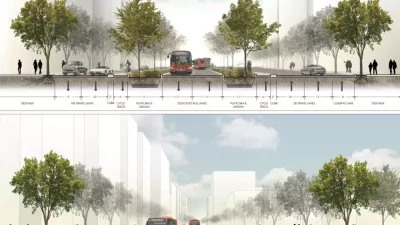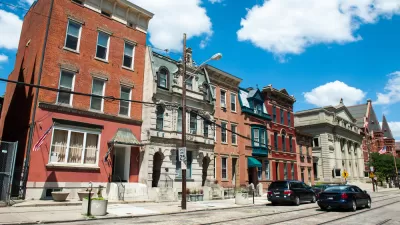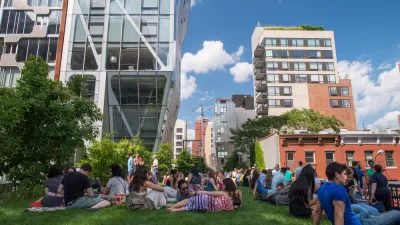Debates

A Roundtable Discussion on the Future of Cities
Since the outbreak of the Covid-19 pandemic, there has been shortage of opinions on the coming evolution of cities. It’s time to check in with the debate.

D.C. Fare-Free Transit Program Could Come at the Expense of the K Street Transitway
When presented with a choice between investing in improved service or funding a fare-free program, the D.C. Council is choosing fare-free transit, and potentially overriding the wishes of the mayor.

Upzoning Modestly Increases Housing Supply and Affordability, Study Says
A new study by researchers at the Urban Institute finds new evidence that upzoning produces housing supply and reduces costs, while downzoning does the opposite.

What Is a YIMBY?
YIMBY, an acronym standing for "Yes In My Backyard," describes advocates who support housing development as a response to the outcomes of restrictive zoning and planning policies.

The Housing Supply Debate: Evaluating the Evidence
Let's rely on science, not ideology and propaganda, when planning solutions to urban unaffordability. Look for credible evidence in the peer-reviewed publications referenced here.

Voters Reject Cincinnati's Affordable Housing Ballot Issue
A charter amendment that would have guaranteed funding for the Cincinnati Housing trust Fund was soundly defeated by voters in a citywide election last week.

Housing Trust Fund Vote Stirs Controversy in Cincinnati
A housing policy debate is taking place on the editorial pages of Cincinnati publications.

A Critical Review of "Sick City: Disease, Race, Inequality and Urban Land"
Patrick Condon's new book, "Sick City: Disease, Race, Inequality and Urban Land" recommends tax reforms and housing subsidies to create more affordable and inclusive communities. It is attractive propaganda that deserves critical analysis.

Opinion: California Should Pass Aggressive Housing Reform
While some lawmakers oppose recent efforts to reform housing policies, others argue the state's affordability crisis calls for bold action.

Density, Affordability, and the 'Hungry Dogs' of Land Price Speculation
Patrick Condon argues that increasing density without affordability inflates urban land values, resulting in nearly all of the value of labor and creative enterprise of entrepreneurs in regional economies being absorbed as land wealth.

The Inclusionary Zoning Debate
New York City's groundbreaking Mandatory Inclusionary Housing Program will turn five years old in March. While some call for the program to be eliminated, others defend it.

An Academic Debate With Very Real Consequences: Land Use Regulations and the Cost of Housing
An article from the journal Urban Studies is inspiring debate and controversy over a year after publication, presenting opposing opinions on fundamental questions about how land use regulation affects the housing market.

The Media Can't Stop Talking About the End of Cities
The latest installment of Planetizen's ongoing effort to track the stories about the future of planning in a world forever changed by COVID-19 notices a recurring theme.

The Great Debate: Will the Pandemic Alter the Course of Urbanism?
The geography for the coronavirus has changed, but most of the debate about the future of cities continues along many of the same lines as in the early months of the pandemic.

The Argument Against Accessory Dwelling Units
Facing the potential for accessory dwelling units to win swift legalization in Chicago inspires one columnist to push back.

Editorial: Save the City by Investing in Equity
A New York Times editorial presents a resoundingly pro-urban call to action regarding the future of planning and investment.

Recent Studies Dig Into the Affordability Effects of Housing Developments
Several recent studies add fuel to the fire of whether market-rate housing helps affordability or drives low-income people from their neighborhoods.

The Journal of the American Planning Association's Single-Family Zoning Debate
Eric Jaffe, writing for Sidewalk Labs, details a recent issue of the Journal of the American Planning Association that debated the future of single-family zoning.

Ten Years of the High Line—Time to Reflect
As the High Line turns ten, a debate about the costs and benefits of urban revitalization continues.

Debating the End of Single-Family Zoning in Toronto
A retired city planner takes a position against "lot splitting," or allowing more than one unit on properties zones for single-family residential as it's known in Toronto.
Pagination
Urban Design for Planners 1: Software Tools
This six-course series explores essential urban design concepts using open source software and equips planners with the tools they need to participate fully in the urban design process.
Planning for Universal Design
Learn the tools for implementing Universal Design in planning regulations.
Gallatin County Department of Planning & Community Development
Heyer Gruel & Associates PA
JM Goldson LLC
City of Camden Redevelopment Agency
City of Astoria
Transportation Research & Education Center (TREC) at Portland State University
Jefferson Parish Government
Camden Redevelopment Agency
City of Claremont


































